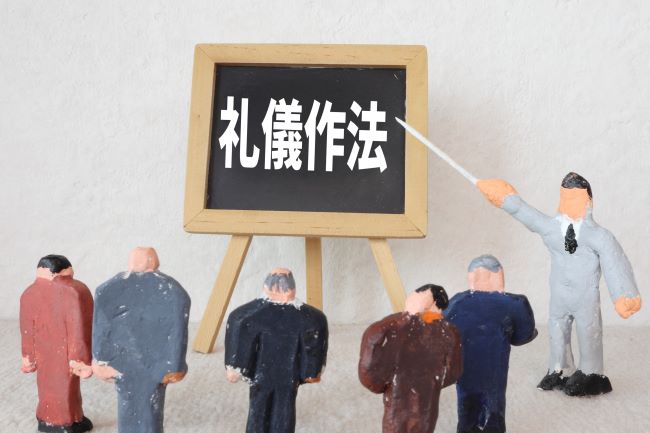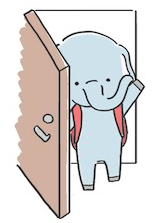Blog Thread
- Japanese Online Newsletter Vol. 175 日本の礼儀と常識(にほんのれいぎとじょうしき)


日本は礼儀を非常に大切にする国です。日本では、相手に対する敬意や感謝の気持ちを表すための言葉や行動が多数存在し、社会全体で礼儀正しく振る舞うことが求められます。
例えば、挨拶や謝罪、お辞儀などは、日常的なコミュニケーションにおいて欠かせないものです。また、公共の場では、静かに過ごすことや、ゴミをきちんと分別することなど、他人や環境への配慮も求められます。
日本人は、こうした礼儀作法を通じて、他者との良好な関係を築き、社会全体が円滑に機能することを目指しています。このような文化的背景から、日本は多くの人から「礼儀正しい国」として認知されています。
❏ 靴を脱いでください
日本には、屋内に入る際に靴を脱ぐという習慣があります。これは、外から土や汚れを持ち込まないため、清潔で快適な室内環境を保つことが目的です。靴を脱ぐ際には、靴を置く場所が用意されていることが一般的です。また、訪問先ではスリッパが用意されていることが多いです。
❏ 大声で話さない 携帯電話を使わない
公共の場や集団生活において、大声で話したり、携帯電話を使うことは控えましょう。 周囲の人々に迷惑をかけるだけでなく、自己中心的な印象を与えることになります。公共の場では、電話をかける場合は、周囲の状況を確認し、静かな場所で行うように心がけましょう。
❏ 歩きタバコ・歩きながらの飲食はやめよう
日本では、歩きタバコや歩きながらの飲食が禁止されている場所が多くあります。これは、周囲の人々に迷惑をかけたり、公共の場を汚したりすることを避けるための措置です。 歩きタバコは、たばこの煙や火花が周囲に飛び散り、人々の健康や衛生面に悪影響を与えるだけでなく、歩行者や車両との事故の原因にもなる可能性があります。また、歩きながらの飲食も同様に、周囲の人々に迷惑をかけることがありますので控えましょう。
❏ 最低でも3~4万円の現金を持って歩こう
日本において、現金はまだ一般的に使用される決済手段のひとつです。特に、小さな店舗や路上の屋台、公共交通機関などでは、クレジットカードや電子マネーなどの非現金決済が利用できない場合があります。そのため、日本では最低でも3~4万円の現金を持って歩くことが望ましいとされています。
❏ 口にものを入れて話さない
これは、相手に不快感を与えたり、聞き取りにくくなったりすることを避けるためです。特に食事中には、口に食べ物を含んでいる状態で話をすることは、礼儀違反とされます。また、公共の場やビジネスシーンでも同様に、口に物を含んでいる状態で話をすることは避けるべきです。
日本は人口密度が高く、狭い空間で多くの人が生活しています。そのため、相手に不快感を与えたり、周囲に迷惑をかけることのないよう、細やかな気配りやマナーが求められます。
また、日本の文化や風習にも、多くの礼儀や常識があります。これらを尊重することは、日本の社会に対する理解を深めるとともに、自分自身のマナー向上にもつながることでしょう。
日本に行かれる方は、日本の文化や風習について事前に学んでおくことをおすすめします。そして、現地の人々との交流を通じて、日本の素晴らしい文化や人々の温かさを体感してみてください。
Courtesy and Common Sense in Japan
Japan is a country that highly values courtesy. In Japan, there are numerous words and actions to express respect and appreciation for others, and the entire society is expected to behave politely.
For example, greetings, apologies, and bowing are essential in everyday communication. In addition, people are expected to be considerate of others and the environment, such as by remaining quiet in public places or properly separating trash, etc.
Through these courtesies, Japanese people aim to build good relationships with others and ensure the smooth functioning of society as a whole. Because of this cultural background, many recognize Japan as a "polite country."
❏ Please take off your shoes.
Removing one's shoes when entering an indoor space is customary in Japan. Taking off shoes prevents bringing in dirt and grime from the outside and keeps a clean and comfortable indoor environment. Therefore, places to put your shoes are commonly available, and slippers are also often available for use.
❏ Do not talk loudly, do not use cell phones.
Do not talk loudly or use cell phones in public places or in groups. Not only is this disruptive to those around you, but it can also give the impression that you are self-centered. When making phone calls in public places, be aware of your surroundings and try to find a quiet area.
❏ Do not smoke or eat while walking.
In Japan, there are many places where smoking while walking or eating and drinking while walking is prohibited. This is done to avoid disturbing others and polluting public spaces. Not only does smoking while walking cause cigarette smoke and sparks to fly into the surrounding area, negatively affecting people's health and hygiene, but it can also cause accidents with pedestrians and vehicles. Similarly, eating and drinking while walking can cause problems for people around you, so please refrain.
❏ Walk with at least 30,000-40,000 yen in cash.
Cash is still one of Japan's most commonly used means of payment. Non-cash payment methods such as credit cards and electronic payments may not be accepted at small stores, street vendors, or public transportation, etc. Therefore, having at least 30,000 to 40,000 yen in cash is advisable.
❏ Do not talk with things in your mouth.
This is to avoid making others uncomfortable or making it difficult for them to hear you. It is considered a breach of etiquette to speak with food in one's mouth, especially during meals. Similarly, talking with food in one's mouth is also not advisable in public and business situations.
Japan is a densely populated country with many people living in small spaces. Therefore, close attention to detail and good manners are required to avoid causing discomfort or inconvenience to others.
Additionally, Japanese culture and customs also have many rules of courtesies and common sense. Respecting these key points will deepen your understanding of Japanese society and improve your manners.
We would suggest that visitors consider studying about Japanese culture and customs in advance, if possible. Then, through interactions with local people, you can experience Japan's incredible culture and the people's warmth.

sign up for the Japanese-Online Newsletter
__..-・**・-..__..-・**・-.._ あいうえお かきくけこ さしすせそ たちつてと なにぬねの はひふへほ まみむめも やいゆえよ らりるれろ わゐうゑを ん __..-・**・-..__..-・**・-.._
#JapaneseOnline #LearningJapanese #FreeJapaneseLessons #JapaneseVideoLearning #JapaneseAnime #Anime #JapaneseFood #Bloguru
- If you are a bloguru member, please login.
Login
- If you are not a bloguru member, you may request a free account here:
Request Account